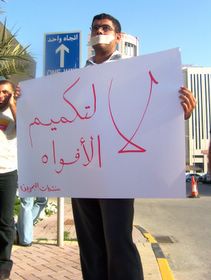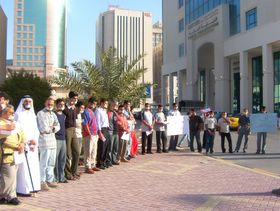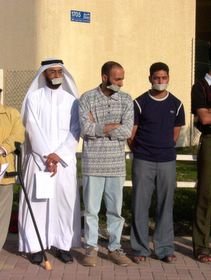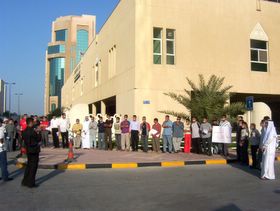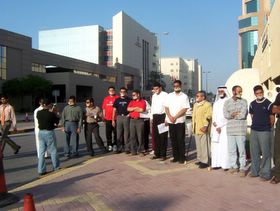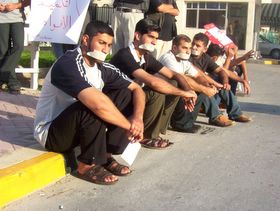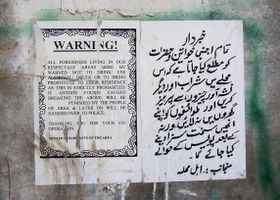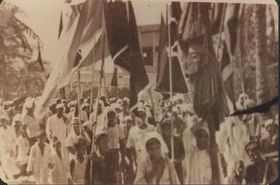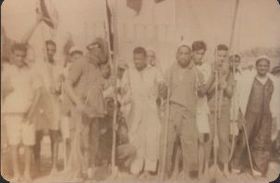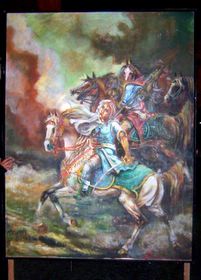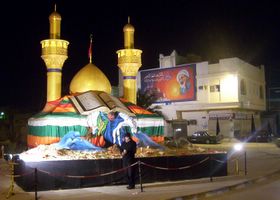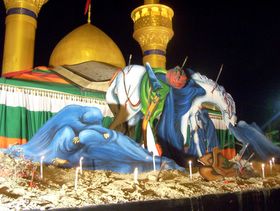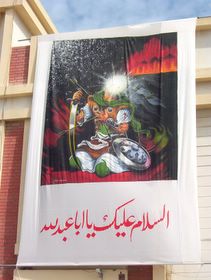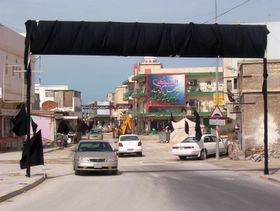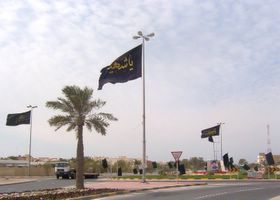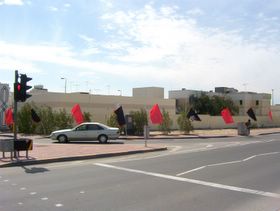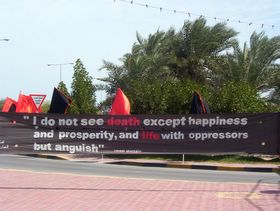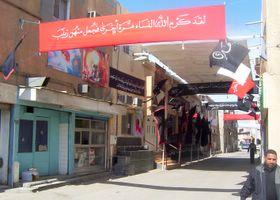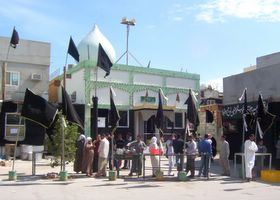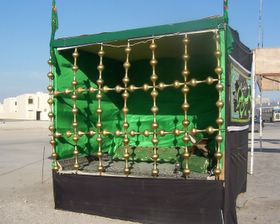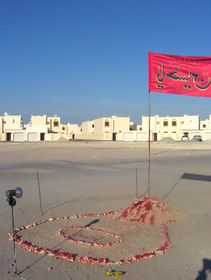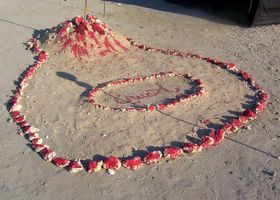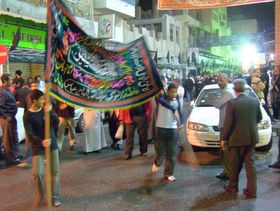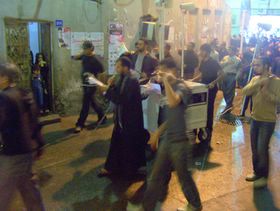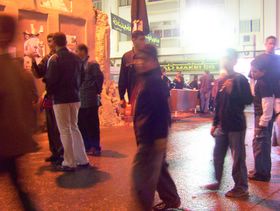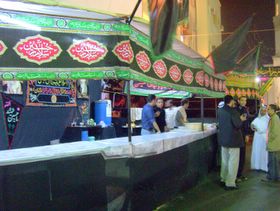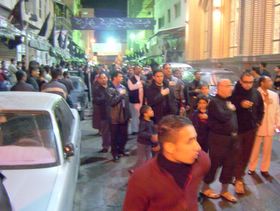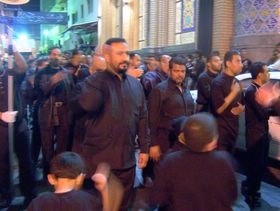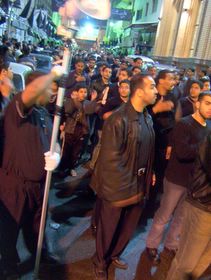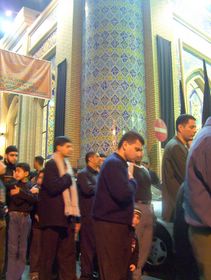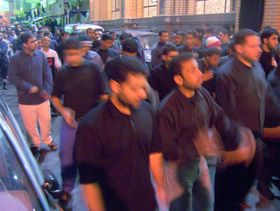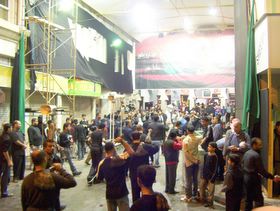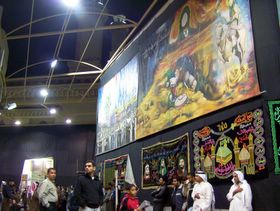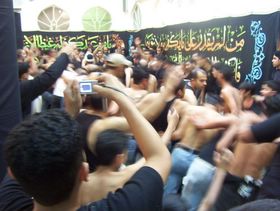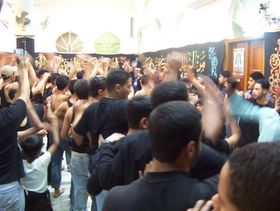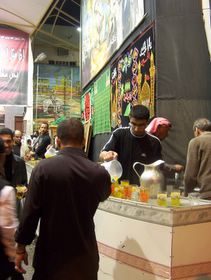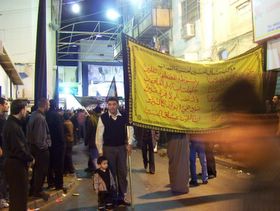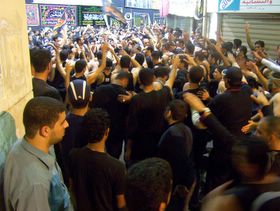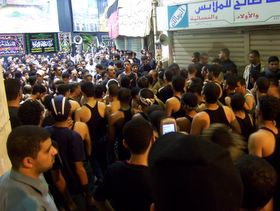Were it not for our terrorist co-religionists, I'm sure that by now Hollywood would have picked up on the story of Karbala and made a movie about it. "The Passion of Hussain" it might have been called. In my opinion, a screen rendering of the tragedy of Karbala has the potential to be far more emotional and moving (and bloody) than Gibson's "The Passion of the Christ". And it contains similar elements of an infinitely righteous protagonist who sacrifices his life for the sake of Humanity.
Even though there may not have yet been any movies made about it, the story of Karbala has for centuries inspired a great deal of poetry and literature throughout the Muslim world. The tradition that I am most familiar with is that of Urdu poetry, and to a lesser extent, poetry in other South Asian languages: Punjabi, Sindhi, Persian. If you're interested, you should read these two short papers on the subject: "Karbala and the Imam Husayn in Persian and Indo-Muslim literature" by the late Prof Annemarie Schimmel, and "Recasting Karbala in the Genre of Urdu Marsiya" by Syed Akbar Hyder. You should definitely read Schimmel's translation and explanation of Shah Abdul Latif Bhittai's "Sur Kedaro" in her paper.

Here, I'm just going to share with you some random verses about Karbala that I am familiar with. But let me start off by sharing a pair of Urdu couplets that I saw on banners hanging right here in Bahrain, near the entrance to Bani Jamra last June (pictured above). I was a quite surprised because I've never seen any Urdu signs in Bahrain before. But anyhow, this was the first couplet:
By God, they are doing virtuous deeds
Those who give consideration to the grief of Hussain
And the second one:
The murder of Hussain is actually the death of Yazid
Islam becomes alive after each Karbala
Hmm... interesting, but by no means the most moving poetry I've read.
One of the most frequently heard poems about Hussain in South Asian Muslim culture is that of the 12th century Indian mystic Moinuddin Chishti. He wrote in Persian:
شاه هست حسین بادشاه هست حسین
دین ﻫست حسین دین پناه هست حسین
سر داد نه داد دست در دست یزید
حقا که بناے لا إلاه است حسین
Translated into English:
Hussain is the Master, Hussain is the King,
Hussain is Faith, Hussain is Refuge for the Faith,
He gave his head but not his hand in Yazid's hand,
Verily Hussain is the foundation of La'Ilah.
To be honest I'm not sure why that poem is so often quoted. Once again, it's nice but it certainly is not as moving as some others.
For something more emotive, definitely read something by Mir Babar Ali Anis, a 19th century Indian poet who perfected the Urdu marsiya (elegy, usually about Hussain) form. Here is an excerpt from Anis's epic marsiya "The Battle of Karbala":
Intoning martial verses, Ali's scion
Advanced with Gabriel's hand upon his shoulder.
Onward he advanced a male lion,
With sleeves rolled up; each step he took grew holder
The bride of battle was in splendour wreathed;
Husain's intrepid sword was now unsheathed.
The flaming sword was wrenched out of its cover,
As moonbeams fly, as perfume leaves the rose,
As a comely maiden taken from her lover,
As breath departs the breast, as red blood flows.
When thunder roared and all the air did swell,
Laila swooned and from her litter fell.
The famous Indian Muslim poet-philosopher Mohammed Iqbal also devoted a section in his Persian language Rumuz-e-Bekhudi ("The Mysteries of Selflessness") to the Tragedy. In this, Iqbal attempts to go beyond the usual story-telling and, in typical Iqbal manner, tries figure out what significance it has for Muslims in the current-day context. Read it here: Concerning Muslim freedom, and the secret of the Tragedy of Karbala.
For me though, I've found some of the most heart-stirring verses about Karbala in Qawwali music, a form of Sufi devotional music developed South Asia. In one of the verses of a qawwali marsiya performed by the late Nusrat Fateh Ali Khan, Imam Hussain's physical beheading is translated into the Sufi concept of Self-annihilation by "chopping off your Ego". Here is my measly attempt at translating the verse from Urdu (obviously, it sounds much better in its original language):
if you are in search of the (Divine) Sight, lower your head during prayer
distance your Self from your heart, erase your Self during prayer
then will the Spirit of God become visible to you during prayer
but first, like Hussain, become beHeaded during prayer
and say "Ya Hussain, Ya Hussain"
Some other interesting words can be found in the Sabri Brothers' qawwali song "Saqia aur pila" ("Cupbearer, bring me more"), which also uses a similar likening of Hussain's physical beheading with spiritual beheading. The song is based on the common Sufi motif of wine and the drunkard; in which wine symbolizes Divine Light. It's a dialogue between the cupbearer and the drunkard, and part way through the cupbearer asks which wine to serve. Again, my very poor translation from Urdu:
A voice arose [that of the cupbearer]: "Which wine shall you drink in your court?
The wine that Mansoor1 drank when he crucified himself? Will you drink that?"
He [the drunkard] replied "No"
"The one that Tabriz2 drank when he flayed himself? Will you drink that?'
He replied "Not this either"
"The one that Sarmad3 drank when he beheaded himself? Will you drink that?"
He replied "Not this either"
"The one that Jesus drank when he awoke the dead? Will you drink that?"
He replied "Not this either"
"The one that Moses drank when he displayed his greatness atop Mount Sinai? Will you drink that?"
He replied "Not this either"
"The one that Job drank when he plundered the riches of patience? Will you drink that?"
He replied "Not this either"
"Then which one?"
He replies: "The wine that was consumed at Karbala!"
At this point the song moves away from the dialogue, and begins to narrate the Tragedy:
the wine that was consumed at Karbala
the wine that was given to Ibn-e-Haidar [i.e. Hussain]
the wine that Zahra's beloved [i.e. Hussain ] drank
after which he gave up his life for the sake of the Master
wounds on his sides, the blood was flowing
the shadow of the Creator on his head
for three days Hussain was without water
despite being the Prophet's grandson
why ask for water from the enemies
when a Luminous Wine was kept right there?
after drinking one cup of "La ilaha"4
in the passion of Love he beheaded himself!
Notes:
1 "Mansoor" here refers to the 9th century Persian mystic Hussain ibn Mansoor al-Hallaj. He is famous for being crucified because of his unorthodox beliefs.
2 "Tabriz" here refers to Shams Tabriz, the spiritual guide of the mystic poet Jalaluddin Rumi. According to popular legend, he was flayed alive because of his unorthodox beliefs.
3 "Sarmad" refers to Mohammed Said Sarmad, an Indo-Armenian mystic poet who was beheaded for his unorthodox beliefs by the Moghul emperor Aurangzeb.
4 "La ilaha" is used as an abbreviation for the phrase "There is no deity except God".
